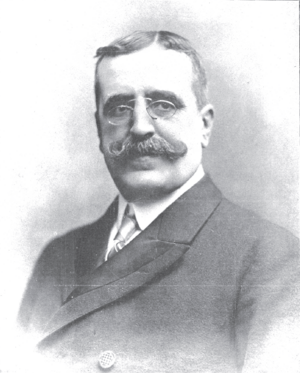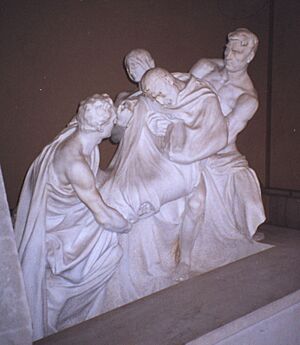José Canalejas y Méndez facts for kids
Quick facts for kids
The Most Excellent
José Canalejas
|
|
|---|---|
 |
|
| Prime Minister of Spain | |
| In office 9 February 1910 – 12 November 1912 |
|
| Monarch | Alfonso XIII |
| Deputy | Manuel García Prieto |
| Preceded by | Segismundo Moret y Prendergast |
| Succeeded by | Álvaro Figueroa, Count Romanones |
| Personal details | |
| Born | 31 July 1854 Ferrol, Spain |
| Died | 12 November 1912 (aged 58) Madrid, Spain |
| Resting place | Pantheon of Illustrious Men |
| Political party | Liberal Party |
| Signature | |

José Canalejas y Méndez (born 31 July 1854 – died 12 November 1912) was an important Spanish politician. He was born in Ferrol and later became the Prime Minister of Spain.
Contents
José Canalejas: His Early Life
José Canalejas was the son of José Canalejas y Casas, a railway engineer and politician, and María del Amparo Méndez Romero. His family moved to Madrid when he was young. He studied law and philosophy at the Central University of Madrid. After university, he worked as a lawyer for a railway company.
Becoming a Spanish Politician
In 1881, Canalejas was chosen to be a deputy for Soria. This meant he represented the people in the Spanish parliament. Two years later, he became an assistant to the Prime Minister.
He also served as a minister in different government departments:
- Minister of Justice in 1888.
- Minister of Finance from 1894 to 1895.
- Minister of Agriculture, Industry, and Commerce in 1902. He resigned from this role because he felt the government was not strong enough.
From 1906 to 1907, Canalejas was the President of the Congress of Deputies. This role is similar to a Speaker in other countries' parliaments.
Leading Spain as Prime Minister
In 1909, there were serious protests and violence in Barcelona, known as the "Tragic Week". After this, the Prime Minister, Antonio Maura, resigned. José Canalejas then became Prime Minister in February 1910. He also became the leader of the Liberal Party.
As Prime Minister, Canalejas wanted to make Spain more democratic. He worked with King Alfonso XIII to introduce new laws. These laws aimed to:
- Get support from working-class people.
- Reduce the power of local political bosses, especially in rural areas.
- Limit the influence of the Catholic Church in education, without harming the Church itself.
These changes helped calm the social unrest that had been happening in Spain.
His Legacy and Death
On 12 November 1912, José Canalejas was tragically shot and killed. He was looking at books in a shop in central Madrid when an anarchist named Manuel Pardiñas attacked him.
Canalejas believed that a monarchy could still be truly democratic. He thought that the government should help people with their money, their rights, and their politics. Some historians believe that his death was a great loss for Spain. They argue that if he had lived, he might have helped Spain avoid some of the problems it faced later on.
See also
 In Spanish: José Canalejas para niños
In Spanish: José Canalejas para niños
 | James B. Knighten |
 | Azellia White |
 | Willa Brown |

